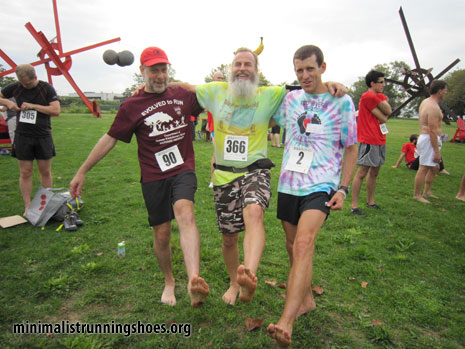
“A man’s errors are his portals of discovery” — James Joyce
In the aftermath of Chris McDougall’s article on natural running in the New York Times, I’ve been flattered by the emails from around the globe of runners sharing their stories of recovery and discovery. Here is my own personal story in even greater detail.
Twice in the past two years, my running shoe store, Two Rivers Treads, which is in the small town of Shepherdstown, West Virginia, was honored to host and gain wisdom from best-selling author and force of nature Chris. Locals came to hear “Mr. Born to Run.”
Chris and I both share a similar pathway in the discovery of better fitness and health through natural running. He is now a world-famous author, and in addition to owning a minimalist shoe store, I am a family physician in a town of 3,000. We both are in our mid 40s, and have trashed our feet and legs along the way, the result of a lifelong addiction to running.
Chris’s bestseller “Born to Run” follows several narrative threads, but it is also his own personal story of “why does my foot hurt?” He discussed the regular trips to the doctors, shoe stores, and orthotic makers. With each escalation in care there was more pain, that is, until he found a different route in the remote Copper Canyon of Mexico where the Tarahumara Indians run in flat-sole tire-tread sandals happily into their 80’s. He also met barefoot runners during his research for the book. He eventually arrived at the conclusion that most conventional running shoes are the cause of running injuries.
I began running barefoot on the beach as a pre-teen and easily covered distances of 10 or more miles. My personal path of pain began in high school and then into a college and post-collegiate running career. I had successes that were often tempered by injury, setbacks, surgery. I had acquired a closet full of arch supports, orthotics, various shoe types. This was always in search of the holy grail of pain- free running.
I pushed through the pain in pursuit of the Olympic Marathon Trials 2:22 standard and came within two minutes on two occasions. When I hit 34 years of age, my first toe joints were fused with arthritis, and I was forced to have surgical procedures to reduce the pain. The prognosis looked bleak for a future in running.
And a lot like Chris’s own trip to Copper Canyon, my journey of discovery began afar: while watching Kenyan runners go barefoot. I applied this natural way of running to my own jogging. I learned how to run softly. Seven months after surgery and with a new efficient and painless running stride, I ran a 2:28 for third place in the 2000 Marine Corps Marathon, only four minutes shy of my best time ever for the distance.
A decade has passed and the learning I gained about natural running only became deeper and broader. You might say that I was being “home-schooled” on all aspects of movement and how the foot interacts with the ground. For example, the Tarahumara Indians run in a style reflective of how we all ran as children; they land lightly on their mid-foot (not the heel), have a slight forward lean, and are completely relaxed and happy. Also, the best shoe was less shoe.
My self-enlightenment about footwear and running was not as immediate as Chris, who experienced it by cultural immersion. Chris and I both agree that it is not about the shoes (or lack thereof), but more about understanding how your body stands and moves, improving strength and function, and then figure out what shoe (if any) to wear. Ten years after the foot surgery and being told not to run, I feel that I’m finally putting all the pieces of the puzzle together. I finished the Boston marathon in 2011 in 2:37:00, practically smiling the whole way. Several months later, I won the Air Force Marathon outright; and back running the day after the race. I love light and flat shoes for road races, trails, casual, and at work to get me secretly close to barefoot at my day job as a physician.
We all have to follow our own path of what works or doesn’t work. Our bodies and past running histories are different. View the resources Natural Running Center, you will have a practical way to make injury-free running a permanent fixture in your own life.
I especially want to thank colleagues for sharing knowledge: Danny Dreyer, Jay Dicharry, Lee Saxby, Danny Abshire, Dr. Ray McClanahan, Dr. Daniel Lieberman, Ian Adamson, Dr. Phil Maffetone, Blaise Dubois, Pete Larson, Dr. Irene Davis, Lorraine Moller, and Nobby Hashizume. And especially Bill Katovsky and Nicholas Pang for helping me create the Natural Running Center.
